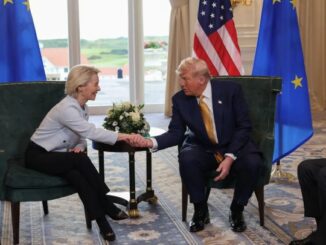
South Asia Brief on where bilateral negotiations stand.
U.S. and Indian officials concluded an initial round of discussions on a bilateral trade deal in New Delhi over the weekend. Talks regarding specific sectors are expected in the next few weeks. The two countries committed to pursuing a deal in February, after Indian Prime Minister Narendra Modi met U.S. President Donald Trump in Washington.
The time frame is tight, with an agreement on the first phase of a trade agreement targeted for the fall. Trade negotiations are especially urgent for India because they are playing out against Washington’s new reciprocal tariffs, which Trump was expected to unveil on Wednesday.
U.S. and Indian officials concluded an initial round of discussions on a bilateral trade deal in New Delhi over the weekend. Talks regarding specific sectors are expected in the next few weeks. The two countries committed to pursuing a deal in February, after Indian Prime Minister Narendra Modi met U.S. President Donald Trump in Washington.
The time frame is tight, with an agreement on the first phase of a trade agreement targeted for the fall. Trade negotiations are especially urgent for India because they are playing out against Washington’s new reciprocal tariffs, which Trump was expected to unveil on Wednesday.
The levies could hit India hard: The country has a nearly $50 billion trade deficit with the United States in its favor. New Delhi’s tariff rates are among the world’s highest; on average, it currently charges more than 10 percent more on U.S. imports than the United States charges on Indian imports. Trump has repeatedly singled out India as a tariff offender.
The U.S.-India trade deal is intended to reduce both tariff and nontariff barriers, meaning that reaching an agreement could help blunt the effects of any new U.S. duties on India’s economy. However, the trade talks will be a slog. India has already committed to increasing imports of U.S. goods, but important Indian economic considerations might make New Delhi unwilling to purchase as much as Washington would like.
We give you energy news and help invest in energy projects too, click here to learn more





